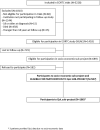Quality of life of long-term childhood acute lymphoblastic leukemia survivors: Comparison with healthy controls
- PMID: 36307941
- PMCID: PMC10099954
- DOI: 10.1002/pon.6060
Quality of life of long-term childhood acute lymphoblastic leukemia survivors: Comparison with healthy controls
Abstract
Objective: Improved treatment landscape has led to better outcomes for paediatric acute lymphoblastic leukemia (ALL) survivors. As the number of survivors increase, we need to elucidate the long-term quality of life (QoL) and domains of complaints in these patients. Furthermore, the main priorities of these patients need to be clarified. We assessed long-term QoL outcomes of survivors of childhood ALL compared to matched population controls.
Methods: QoL data were collected from survivors recruited in France and Belgium between 2012 and 2017, including the Short Form Health Survey (SF-12) and the Quality of Life Systemic Inventory (QLSI). The Wilcoxon test was used to compare SF-12 scale scores between survivors and matched population controls. For the QLSI, comparisons were mainly descriptive.
Results: One hundred and eighty-six survivors (mean age: 27.6 years; range: 18.1-52.8) at follow-up completed QoL measures, amongst whom 180 were matched to controls. Overall, survivors had higher QoL on all SF12 scale scores, indicating that they had better functioning compared to controls. Statistically significant differences on the SF12 were observed for Vitality, Social Functioning, Role Limitations due to Emotional Problems and Mental Health scales. QLSI outcomes suggested that survivors were happier than controls with Couple and Social Relations. Controls were unhappiest compared to survivors with Money, Love life, Self-esteem, Nutrition and Paid Work.
Conclusions: Our findings suggest that survivors of childhood ALL have better QoL outcomes on some domains compared to the general population, specifically around social and emotional functioning, and that they tend to prioritize their relationships more. Interventions for improving QoL outcomes, might build on existing positive experiences with family, friends and partners.
Keywords: adolescent; cancer survivors; child; leukemia, acute lymphoblastic; quality of life; survivorship; young adult.
© 2022 The Authors. Psycho-Oncology published by John Wiley & Sons Ltd.
Conflict of interest statement
The authors report no conflicts of interest.
Figures
Similar articles
-
Quality of Life Priorities of Childhood Acute Lymphoblastic Leukemia Survivors Enrolled in EORTC Studies, and a Comparison of Instruments.Pediatr Blood Cancer. 2025 Feb;72(2):e31446. doi: 10.1002/pbc.31446. Epub 2024 Nov 30. Pediatr Blood Cancer. 2025. PMID: 39616416
-
Potential gonadotoxicity of treatment in relation to quality of life and mental well-being of male survivors of childhood acute lymphoblastic leukemia.J Cancer Surviv. 2013 Sep;7(3):404-12. doi: 10.1007/s11764-013-0285-7. Epub 2013 Apr 19. J Cancer Surviv. 2013. PMID: 23604999
-
High health-related quality of life among long-term survivors of childhood acute lymphoblastic leukemia.Pediatr Blood Cancer. 2010 Aug;55(2):331-6. doi: 10.1002/pbc.22531. Pediatr Blood Cancer. 2010. PMID: 20582965
-
Health-related quality of life of survivors of childhood acute lymphoblastic leukemia: a systematic review.Qual Life Res. 2018 Jun;27(6):1431-1443. doi: 10.1007/s11136-018-1788-5. Epub 2018 Jan 25. Qual Life Res. 2018. PMID: 29372438
-
Psychological status in childhood cancer survivors: a report from the Childhood Cancer Survivor Study.J Clin Oncol. 2009 May 10;27(14):2396-404. doi: 10.1200/JCO.2008.21.1433. Epub 2009 Mar 2. J Clin Oncol. 2009. PMID: 19255309 Free PMC article. Review.
Cited by
-
Genetic Factors and Long-term Treatment-Related Neurocognitive Deficits, Anxiety, and Depression in Childhood Leukemia Survivors: An Exome-Wide Association Study.Cancer Epidemiol Biomarkers Prev. 2024 Feb 6;33(2):234-243. doi: 10.1158/1055-9965.EPI-23-0634. Cancer Epidemiol Biomarkers Prev. 2024. PMID: 38051303 Free PMC article.
-
Health-related quality of life and its determinants during and after treatment for paediatric acute lymphoblastic leukaemia: a national, prospective, longitudinal study in the Netherlands.BMJ Open. 2023 Oct 29;13(10):e070804. doi: 10.1136/bmjopen-2022-070804. BMJ Open. 2023. PMID: 37899146 Free PMC article.
-
Factors Associated with Psychological Well-Being Among Children Under 18 Years Old with Cancer: A Scoping Review.Psychol Res Behav Manag. 2025 Jan 9;18:39-53. doi: 10.2147/PRBM.S488905. eCollection 2025. Psychol Res Behav Manag. 2025. PMID: 39807478 Free PMC article. Review.
References
-
- American Cancer Society . What is acute lymphocytic leukemia (ALL)? Accessed November 2, 2021. https://www.cancer.org/cancer/acute‐lymphocytic‐leukemia/about/what‐is‐a...
-
- Childhood cancer survivorship: improving care and quality of life. In: Hewitt M, Weiner SL, Simone JV, eds. Institute of Medicine and National Research Council. National Academies Press; 2003. - PubMed
Publication types
MeSH terms
LinkOut - more resources
Full Text Sources
Research Materials


